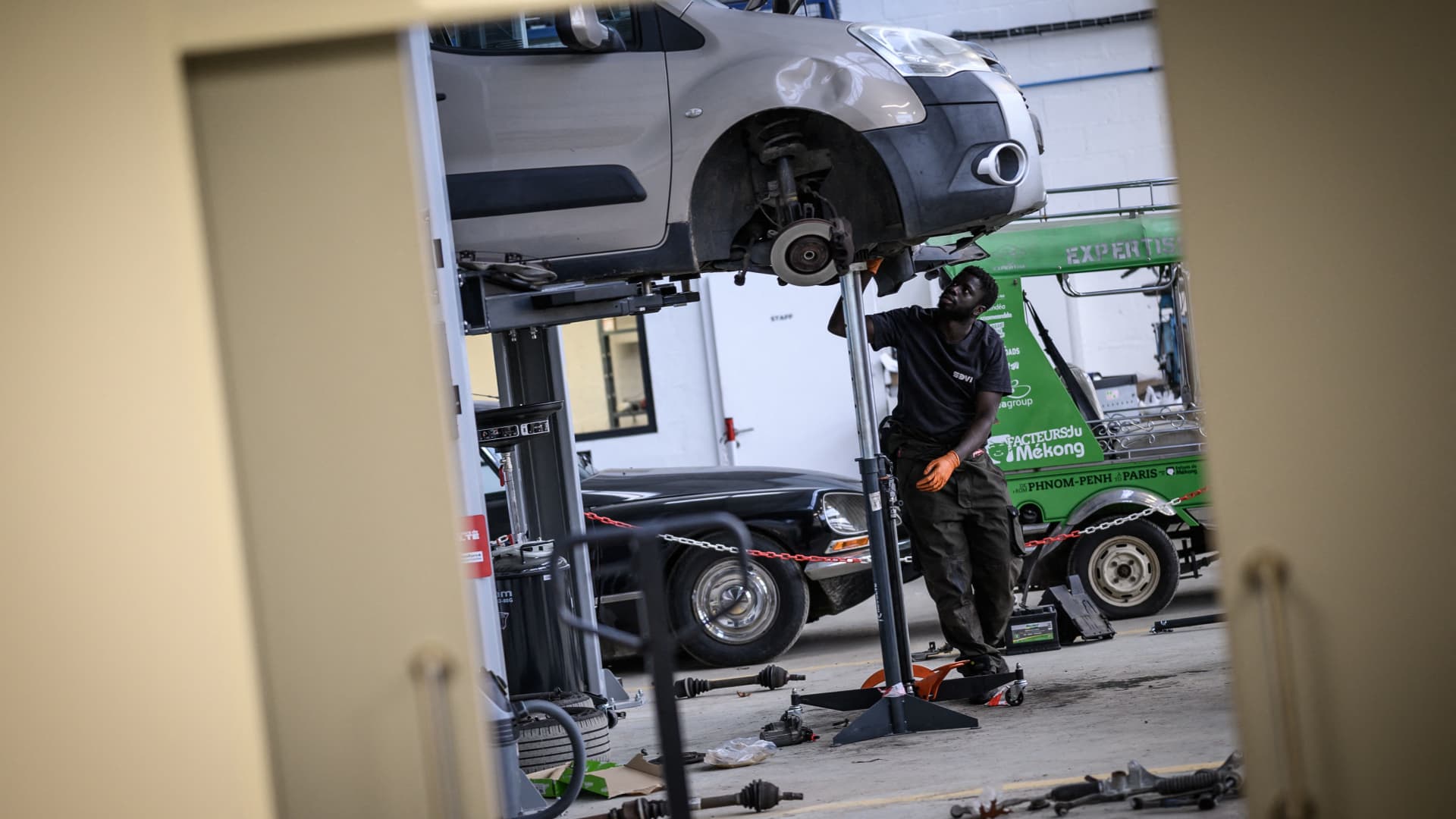The reason why the labor shortage puts the brakes on the shift to EVs

A mechanic works on an electric car in a garage in Carquefou, France, November 2022. The EU aims to increase the number of EVs on the road in the next few years.
Loic Venans | AFP | Getty Images
From seat belts to airbags to radios to parking sensors, today’s cars are packed with innovations that transform the cars we drive.
Thanks to growing concerns about emissions from road-based transport, several major economies are gearing up for another major shift: the mass deployment of electric vehicles.
For example, the UK wants to stop selling new diesel and petrol cars and vans by 2030 and requires all new cars and vans to have zero tailpipe emissions from 2035. To do.
The European Union, which the UK left on January 31, 2020, pursuing similar goals. And in America, California, the most populous state in America, ban the sale of new gasoline cars By 2035.
The above goals are many years away, but little by little we are seeing a change.
Take the UK for example. According to the Society of Motor Manufacturers and Traders, a record 234,066 battery electric, plug-in hybrid and hybrid electric vehicles will be produced in factories in 2022, accounting for 30.2% of total vehicle production. rice field.
The industry group said: “Total BEV production increased by 4.8% and hybrid production by 4.3%. Increasing production of these vehicles will achieve net zero in both the UK and key international markets. It’s important for us,” he said.
As the number of EVs on the road increases, a workforce with the knowledge to repair and properly maintain them will be required.
However, there are concerns that a skills gap will emerge in the near future, creating major headaches for both the automotive sector and drivers.
In January, the Automobile Industry Association, a professional body for people employed in the field, said around 16% of UK engineers had relevant qualifications to work in electric vehicles.
“IMI forecasts that the number of IMI TechSafe certified technicians required to handle electric vehicles will be 77,000 by 2030, increasing to 89,000 by 2032,” it said.
“In line with Auto Trader Insight’s predictions, this suggests that a skills gap (when there are not enough technicians to service electric car parks) will emerge in 2029,” he added. “Park” is the SMMT term for “the total stock of vehicles on the road.”
According to IMI’s January 2023 forecast, the size of this skills gap will soar from 700 in 2029 to 13,100 in 2032.
But what does such a scenario look like in practice? IMI CEO Steve Nash told CNBC that there are “some potential problems.”
“One is just a matter of convenience that people have to go farther than people want to find someone with the right qualifications to do the job,” he said. .
“The other can be costly, of course, because there is more demand and fewer people around. [to work on the vehicles] …which can also affect the cost of the service. “
Safety is another concern. “It’s always a concern … if the job is out there and there’s no one to do it, certain people will take a risk — and that’s a real risk,” Nash said.
“Some of these vehicles are running on DC currents as high as 800 volts. Of course, you don’t need something like that to be lethal,” he added.
break things down
Nash acknowledged the importance of seeing the new generation of vehicles as being “electrified” and consisting of pure electric, hybrids and plug-in hybrids.
“But fundamentally, an electric car is completely different than an internal combustion engine car,” he said.
“So anyone who has spent their life working on internal combustion engines cannot simply switch from one to the other.”
“Electric vehicles also run at very high voltages, which carries inherent risks.”
During the interview, Nash stressed the importance of having a skilled workforce. He argued that while people in cars face the greatest risk, “it’s not a risk if you know what you’re doing, but it’s not a risk at all.”
“Working with internal combustion engines is risky, but it took me 100 years to get used to it.”
IMI isn’t the only company keeping an eye on how the growing number of electric vehicles will play out on our roads.
In a statement sent to CNBC, AVERE (European Electromobility Association) touched on the changes taking place in the automotive workforce.
“EVs require less intensive work than fossil-fueled vehicles, so there is a shift in the market as jobs shift from car production to battery production,” the company said. “We are seeing more EVs on the road and charging infrastructure being installed.”
The transition has created “a significant demand for skilled workers to fill many upcoming vacancies,” the company added.
“As the growth of e-mobility becomes more important year by year, there is an urgent need to close this gap.
“Bridging the Skills Gap”
In January, IMI announced that despite more than 11,500 technicians undergoing the training and certifications required to earn an IMI TechSafe professional certification in the first nine months of 2022, the “pacing of training ‘ has been ‘declining’.
At the time, Nash said, “It’s important that the sector keeps its workforce trained and skilled at a significant rate.”
“However, there is concern that the current economic pressure will cut training budgets first,” he added.
Nash went on to explain that government support for training was “essential,” and emphasized that message in an interview with CNBC.
“As far as the tech population goes…I think people working on cars need to see a continuation of the ongoing efforts. [on] … at this point. “
“We are narrowing the skills gap little by little, but it… needs to be maintained.”
In a statement sent to CNBC, a government spokesperson said: “The number of qualified mechanics for electric vehicles in the UK is now far outstripping demand.”
“The UK government is working closely with industry to keep the UK momentum going and we are confident that manufacturers will have the trained staff they need to meet the growing demand.” they added.
“We are ensuring that the UK has the skills to stay at the forefront of the EV industry through our investment in Skills Bootcamps, Electrification Skills Boosts and Apprenticeships, by 2024-25. will increase to £2.7bn in
https://www.cnbc.com/2023/02/27/how-a-shortage-of-workers-could-put-the-brakes-on-the-shift-to-evs.html The reason why the labor shortage puts the brakes on the shift to EVs



